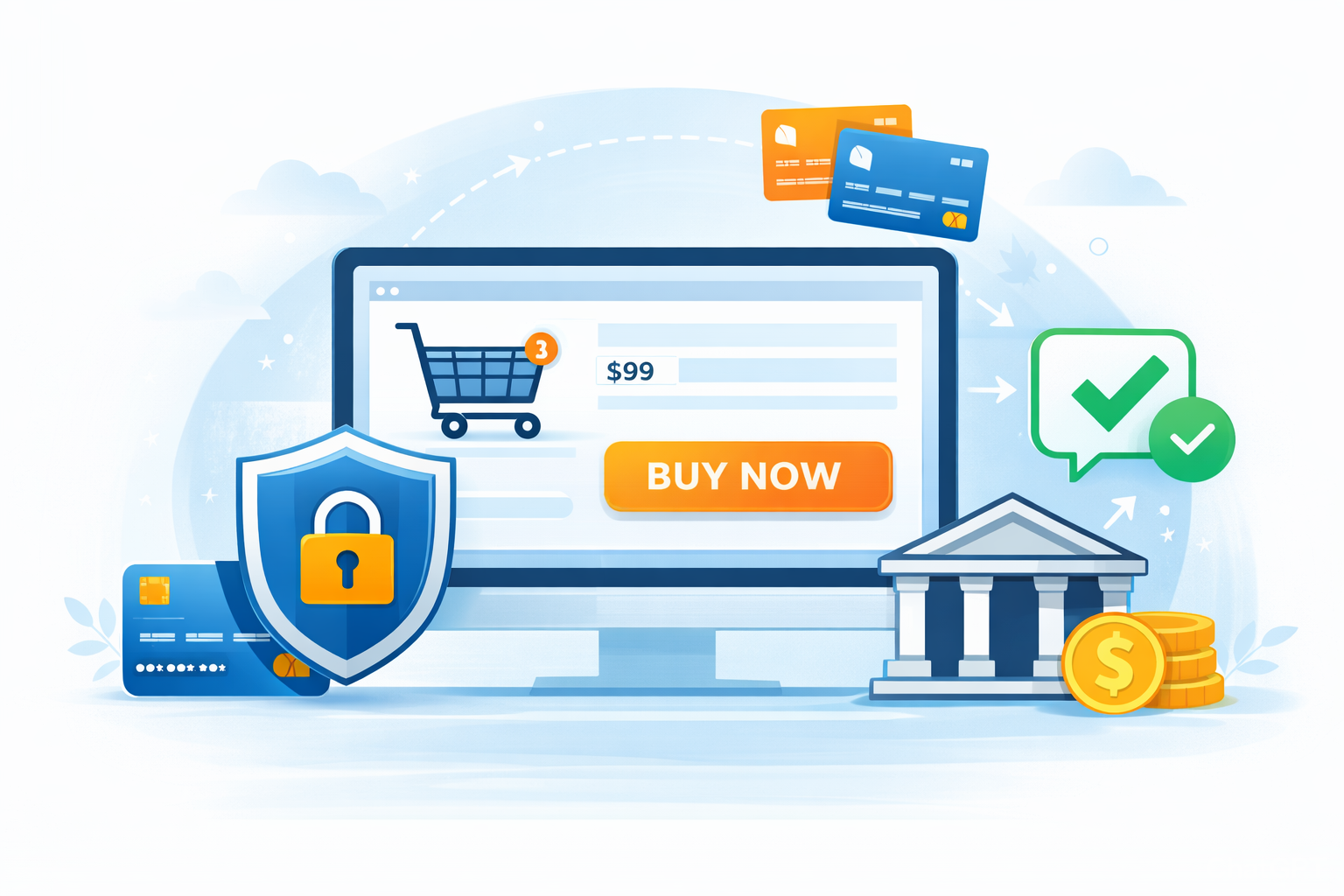Try Zipchat in Action!
Enter your store URL to see how Zipchat would behave.

In today's digital era, social media has become an integral part of our daily lives. It has revolutionized the way we connect, communicate, and consume information. But did you know that social media can also be a powerful tool to boost sales for your Shopify store? That's right! By effectively leveraging social media platforms, you can reach a wider audience, increase brand visibility, and ultimately drive more sales for your online business.
Understanding the Power of Social Media for E-commerce
Social media has unparalleled reach and influence in today's e-commerce landscape. With billions of active users across various platforms, it offers an immense opportunity for Shopify merchants to connect with their target audience. According to a survey conducted by Statista, approximately 47% of consumers worldwide reported buying products they discovered on social media platforms.

Furthermore, social media allows you to build a community around your brand, engage with your customers, and gain valuable insights into their preferences and purchasing behavior. By tapping into this wealth of information, you can tailor your marketing strategies to effectively attract and retain customers.
The Role of Social Media in Today's E-commerce Landscape
Social media plays a pivotal role in shaping consumer behavior, especially when it comes to online shopping. It acts as a virtual storefront, allowing potential customers to discover products, read reviews, and engage with brands. According to Shopify's State of Commerce report, social media accounted for a significant portion of referral traffic to Shopify stores, indicating its impact on purchase decisions.
Moreover, social media platforms offer a range of features, such as shoppable posts and integrated checkout options, that facilitate seamless transactions and enhance the overall shopping experience. Imagine a customer scrolling through their Instagram feed, stumbling upon a beautifully styled photo of a product they've been eyeing. With just a few taps, they can now make a purchase without ever leaving the app. This convenience and ease of use make social media an indispensable tool for e-commerce businesses.
Why Shopify Merchants Should Embrace Social Media
As a Shopify merchant, embracing social media is paramount to achieving long-term success. The platform offers numerous benefits that can catapult your business growth:
- Increased brand visibility: Social media allows you to raise awareness about your brand and products. By consistently sharing engaging and valuable content, you can capture the attention of potential customers and expand your reach.
- Targeted marketing: With social media's advanced targeting options, you can tailor your marketing efforts to specific demographics, interests, and behaviors. This precision targeting ensures that your messages resonate with the right audience, improving the conversion rate of your campaigns.
- Customer interaction: Social media provides a platform for direct communication and engagement with your customers. By promptly addressing queries, responding to feedback, and providing personalized recommendations, you can foster strong customer relationships and encourage repeat purchases.
- Competitive advantage: In today's competitive e-commerce landscape, having a strong social media presence sets you apart from your competitors. It adds credibility to your brand, helps you stay top-of-mind with customers, and enables you to showcase your unique selling propositions.
By leveraging the power of social media, Shopify merchants can tap into a vast pool of potential customers, foster meaningful connections, and drive sustainable growth. So, whether you're just starting out or looking to expand your online business, embracing social media is a strategic move that can propel your e-commerce success to new heights.
Setting Up Your Social Media Strategy
Now that you understand the importance of social media for your Shopify store, it's time to set up a robust social media strategy that aligns with your business goals. Here are the key steps to get you started:

Identifying Your Target Audience on Social Media
Before diving into the world of social media, it's crucial to identify your target audience. Conduct market research to understand their demographics, preferences, and online behavior. This insight will help you select the right social media platforms to focus on, as each platform attracts different user demographics and engagement patterns.
For example, if your target audience consists primarily of young adults, platforms like Instagram and TikTok might be more effective in reaching them. On the other hand, if your products cater to professionals in specific industries, platforms like LinkedIn may be more suitable.
Choosing the Right Social Media Platforms for Your Shopify Store
Once you have a clear understanding of your target audience, it's time to choose the social media platforms that will yield the best results for your Shopify store. Consider the following factors:
- User demographics: Select platforms that align with your target audience demographics. For instance, if your products cater to a primarily female audience, platforms like Pinterest and Facebook may offer better opportunities for reaching them.
- Platform features: Evaluate the features and functionality of each social media platform. Some platforms, such as Instagram, focus heavily on visual content, whereas others, like Twitter, prioritize short-form text-based updates. Choose platforms that allow you to showcase your products and engage with your audience in a way that aligns with your brand identity.
- Competition: Analyze your competitors' social media presence to identify which platforms they are successful on. This can provide valuable insights into where your target audience is already active and highlight potential gaps in the market that you can exploit.
Creating a Consistent Brand Image Across Platforms
Consistency is key when it comes to building a strong brand image on social media. Develop a cohesive visual identity that is consistent across all platforms, including your Shopify store. This includes your logo, color scheme, typography, and overall aesthetic. Consistency builds brand recognition and fosters trust among your audience.
Furthermore, create a clear brand voice and tone that resonates with your target audience. Whether your brand persona is playful, informative, or authoritative, ensure that it remains consistent across all your social media channels. This consistency helps strengthen your brand identity and makes it easier for customers to recognize and engage with your content.
But what about the content itself? It's not enough to just have a presence on social media platforms; you need to create compelling and valuable content that resonates with your audience. This could include sharing product updates, behind-the-scenes glimpses of your business, customer testimonials, or even educational content related to your industry.
Remember, social media is not just a promotional tool; it's an opportunity to build relationships with your audience. Engage with your followers by responding to comments and messages, asking for their opinions, and encouraging user-generated content. By fostering a sense of community, you can turn your social media followers into loyal customers and brand advocates.
Optimizing Your Social Media Content for Sales
Now that you have a solid foundation for your social media strategy, it's time to optimize your content to drive sales for your Shopify store. Here are some techniques to consider:
The Art of Crafting Engaging Posts
When it comes to social media, attention spans are short, and competition for users' attention is fierce. To stand out and capture your audience's interest, you need to craft engaging posts that are visually appealing, informative, and shareable.
Start by understanding your audience's interests, pain points, and motivations. Use this insight to create content that resonates with them, whether it's through compelling storytelling, educational tips, or entertaining visuals. Experiment with different formats such as images, videos, infographics, and even interactive content to keep your feed diverse and engaging.
For example, let's say you run a Shopify store that sells eco-friendly products. Instead of simply posting product images, you could create a series of short videos showcasing the environmental benefits of your products. These videos could feature interviews with experts, behind-the-scenes footage of your production process, and testimonials from satisfied customers. By providing valuable and engaging content, you not only capture your audience's attention but also establish yourself as a trusted source in your industry.
Utilizing Social Media Advertising for Product Promotion
While organic reach on social media can be effective, supplementing your efforts with targeted advertising can significantly boost your sales. Social media platforms offer robust advertising features that allow you to reach specific audiences based on their demographics, interests, and online behavior.
Investing in social media advertising not only increases your visibility but also enables you to drive traffic directly to your Shopify store. Experiment with different ad formats, such as carousel ads, product catalogs, or sponsored posts, to find the best performing campaigns for your products.
For instance, let's say you sell handmade jewelry on your Shopify store. You could create a carousel ad showcasing different pieces from your collection, highlighting their unique features and craftsmanship. By targeting users who have shown an interest in similar products or have engaged with jewelry-related content, you can increase the chances of converting them into paying customers.
Harnessing User-Generated Content to Boost Trust
Word-of-mouth has always been a powerful marketing tool, and social media amplifies its impact even further. Encourage your customers to share their experiences with your products by soliciting user-generated content (UGC).
UGC not only builds trust among potential customers but also serves as authentic social proof of your product's quality. Repost customer reviews, testimonials, and photos of customers using your products. This not only showcases the benefits of your products but also creates a sense of community around your brand, fostering loyalty and encouraging others to make a purchase.
Take, for example, a Shopify store that specializes in fitness apparel. You could create a dedicated hashtag for customers to use when sharing their workout photos or videos while wearing your products. By reposting this UGC on your social media accounts, you not only showcase the versatility and quality of your apparel but also inspire others to join the fitness community you've created.
Additionally, you could run contests or giveaways that encourage customers to share their experiences with your products. This not only generates excitement and engagement but also provides you with a steady stream of UGC that you can leverage to promote your brand.
Converting Social Media Followers into Shopify Customers
Having a large number of followers on social media is great, but it's equally important to convert them into paying customers for your Shopify store. Here's how you can achieve that:
Driving Traffic from Social Media to Your Shopify Store
Make it easy for your social media followers to navigate to your Shopify store by including direct links in your profile bios, posts, and stories. Use enticing call-to-actions (CTAs) that prompt users to visit your store, such as "Shop Now," "Learn More," or "Limited Time Offer."
But how do you ensure that your social media posts stand out from the crowd and capture the attention of your followers? One effective strategy is to create visually appealing content that aligns with your brand identity. Use high-quality images, videos, and graphics that showcase your products in an engaging way. By creating a visually cohesive feed, you can establish a strong brand presence and entice your followers to explore your Shopify store.
Additionally, consider offering social media-exclusive discounts or promotions to incentivize your followers to make a purchase. By providing a seamless and rewarding shopping experience, you can encourage repeat purchases and increase customer loyalty. Remember, a satisfied customer is not only likely to make future purchases but also to recommend your store to others.
Using Social Media for Customer Engagement and Retention
Effective customer engagement is key to building a strong relationship with your audience and fostering brand loyalty. Use social media to actively engage with your followers by responding to comments, addressing queries, and acknowledging their feedback.
But engagement shouldn't stop at simply responding to comments. Take it a step further by initiating conversations with your followers. Ask open-ended questions, seek their opinions on new product ideas, or invite them to share their experiences with your brand. By making your audience feel valued and involved, you can create a sense of community around your brand and foster long-term customer loyalty.
Encourage user-generated content by running contests and giveaways, asking for opinions and feedback, and featuring customer stories or testimonials. User-generated content not only adds authenticity to your brand but also serves as social proof, influencing potential customers to trust your products and make a purchase. By leveraging the power of user-generated content, you can amplify your reach and build a loyal customer base.
Measuring the Impact of Your Social Media Efforts on Sales
Finally, it's crucial to measure the impact of your social media efforts on your Shopify sales. Utilize social media analytics tools to track key performance indicators (KPIs) such as engagement rate, reach, click-through rates, conversions, and revenue generated.
But tracking these metrics is just the first step. To truly understand the impact of your social media efforts, it's important to analyze the data and draw meaningful insights. Look for patterns and correlations between your social media activities and sales performance. For example, you may notice that certain types of content or promotional campaigns lead to higher conversion rates. By identifying these trends, you can refine your social media strategy and allocate resources more effectively.
Regularly review these metrics to identify trends, measure the success of your campaigns, and make data-driven adjustments to your social media strategy. This iterative approach ensures that you continuously optimize your efforts and maximize your return on investment (ROI). Remember, social media is a dynamic and ever-evolving landscape, so staying agile and adaptable is key to staying ahead of the competition.
Advanced Social Media Techniques for Shopify Sales Growth
Once you've implemented the fundamental strategies, you can explore more advanced techniques to further boost your Shopify sales through social media:

Exploring Influencer Marketing Opportunities
Influencer marketing has gained significant traction in recent years. Collaborating with influencers in your niche can expose your brand to their engaged followers, driving targeted traffic to your Shopify store.
Identify influencers whose values align with your brand, and reach out to them with collaboration proposals. This could involve sponsored content, product reviews, or even influencer takeovers of your social media channels. By leveraging the trust and influence of established influencers, you can tap into their loyal audience and increase your sales potential.
Leveraging Social Media Analytics for Sales Forecasting
Social media analytics provide valuable insights into consumer behavior, preferences, and trends. By analyzing these data points, you can make more accurate sales forecasts and align your stock levels, marketing budgets, and promotional activities accordingly.
Identify patterns in peak engagement periods, high-converting content, and customer feedback. Use this information to plan your product launches, promotional campaigns, and even retargeting efforts. By staying ahead of the market trends, you can ensure that your Shopify store is well-positioned to seize every sales opportunity.
Implementing Social Commerce on Your Shopify Store
Social commerce is the integration of social media and e-commerce, allowing customers to make direct purchases without leaving the social media platform. By implementing social commerce features on your Shopify store, you can streamline the buying process, reduce friction, and increase conversion rates.
Utilize "Buy Buttons" or "Shop Now" features on your social media posts to enable convenient and seamless shopping experiences for your customers. Additionally, leverage social media shopping tags, such as Instagram's product tags or Pinterest's buyable pins, to showcase your products directly within users' feeds.
In conclusion, harnessing the power of social media is vital for Shopify merchants looking to grow sales and thrive in the ever-evolving e-commerce landscape. By understanding the role of social media, setting up a robust strategy, optimizing your content, and effectively converting followers into customers, you can unlock the full potential of social media to drive sales for your Shopify store. Embrace social media's vast reach, engage with your audience authentically, and leverage data-driven insights to stay ahead of the competition. Together, social media and Shopify can be a winning combination for your e-commerce success.
Take Your Shopify Sales to the Next Level with Zipchat AI
Maximize your social media strategy and transform your Shopify store's customer engagement with Zipchat AI. As the most powerful AI Chatbot for Ecommerce, Zipchat AI not only proactively engages with your visitors to boost product sales but also effortlessly handles customer support, leading to an impressive average conversion rate of 13.4% from Chat-to-Sale. Ready to elevate your e-commerce experience? Start a 7-Day Free Trial today and watch your sales soar!








